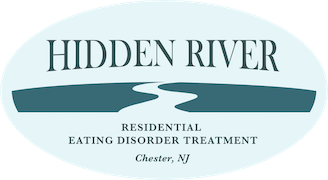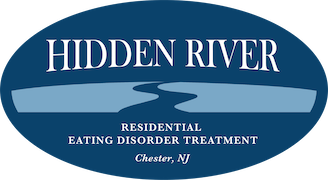A Nutrition and Culinary Skills Training Program for Eating Disorder Treatment
In today’s blog post, we want to share more about Hidden River’s residential eating disorder treatment with a focus on the nutrition and culinary skills training program that uses Exposure Response Prevention.
Eating disorders are complex mental health disorders that require a well-trained and sophisticated multidisciplinary team approach.
There are five levels of care that a patient may receive based on their ability to effectively consume and retain a reasonable amount of nutrition. The levels of care are: inpatient, residential, partial hospital, intensive outpatient, and outpatient.
A residential level of care is engaged when a patient is medically and psychiatrically in a stable position, which means that they do not qualify for a higher inpatient level of care. Simultaneously, individuals at this level lack the ability to effectively remain stable while residing in the family home and attending a lower level of care, such as a partial hospital, intensive outpatient, or outpatient program. The residential treatment option provides a uniquely suited, multidisciplinary team approach and 24-hour support for the patient while they develop the personal fortitude and resilience necessary to manage the experiences of daily living. One of the central treatment goals at the time of making the transition from an eating disorder residential treatment center to any one of the lower levels of care is that the patient can effectively consume and retain the necessary nutrition to support medical and psychiatric stability with some level of independence.
The treatment team at Hidden River has taken these important food-related features into account when designing the nutrition education and culinary skills training programs.
A patient’s anxiety when it comes to nutrition is real and often debilitating. Anxiety presents as an irrational mind in a state of terror, which is then inadvertently misdirected towards the consumption and retention of nutrition. This maladaptive behavior destabilizes nutrition consumption, and, in turn, facilitates physical malnutrition. Taken together, this is known as an eating disorder.
The multidisciplinary treatment team at Hidden River has developed, as an enhancement to the nutrition education and consumption program, an advanced culinary skills training program that was designed using principles from Exposure Response Prevention therapy. By implementing culinary skills training with the use of exposure response prevention protocols, patients can effectively reduce fear from their perceptual equation.
A narrative review conducted in 2018 showed that culinary skills programs improved young people’s healthy eating behaviors1, which shows the efficacy of this type of program. This is particularly impactful when combined with Exposure Response Prevention. One study determined that, because of the overlap in symptoms between anorexia nervosa and anxiety, Exposure Response Prevention was a suitable intervention to prevent relapse into eating disorders2.
Our culinary skills training program originates with the use of several assessment quizzes to reveal a patient’s knowledge of meal preparation and the kitchen environment. These quizzes consider the patient’s incoming understanding and use of menu planning, grocery shopping, kitchen appliances and utensils, the kitchen’s organization, safe food storage, effective cleaning techniques, meal preparations, and much more.
After the quizzes, Registered Dietitians design a patient-specific intervention plan that will improve the patient’s confidence to prepare and consume their nutrition, helping them overcome their specific fear. Following education sessions, the patient engages in guided therapeutic experiential training, which gradually exposes them to the safe handling of the appliances and sharp utensils as well as basic food preparations. Patients learn how to make meal plans, read recipes, shop for ingredients, and prepare meals to completion. This means that they often use a stove top, oven, crock pot, toaster, blender, knives, microwave, pots, pans, utensils, and/or dishwasher. The skills required to properly spice food products, boil, bake, baste, fry, and roast may also be included within their experiential training.
Thanks to the nutrition and culinary skills training program at Hidden River, patients gain so much more than expertise in the kitchen.
Hidden River recognizes that, when a patient completes the residential eating disorder treatment program and effectively prepares their meals and snacks from conception to consumption, they experience a reduction in anxiety, increase their confidence to manage nutrition, and ultimately succeed at moving towards the resolution of the eating disorder. The Hidden River nutrition and culinary skills training program has proven to be a central feature of their approach to residential treatment, designed to support patients in their journey to achieve a functional level of independence.
For more information, please go to www.hiddenriverhealing.com.
References
- Steinglass, J.E., Sysko, R., Glasofer, D., Albano, A.M., Simpson, B., Walsh, T. (2011). Rationale for the application of exposure and response prevention to the treatment of anorexia nervosa. International Journal of Eating Disorders, 44(2).
- Muzaffar, H., Metcalfe, J.J., Fiese, B. (2018). Narrative Review of Culinary Interventions with Children in Schools to Promote Healthy Eating: Directions for Future Research and Practice. Current Developments in Nutrition, 2(6).






Leave a Reply
You must be logged in to post a comment.